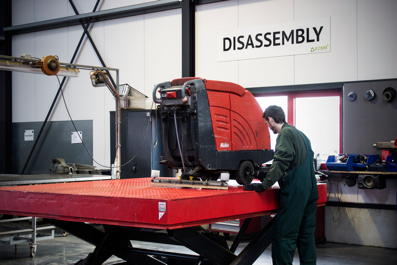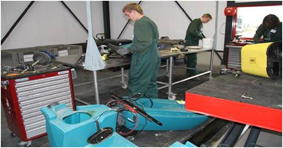 Cleanzine: your weekly cleaning and hygiene industry newsletter 3rd July 2025 Issue no. 1169
Cleanzine: your weekly cleaning and hygiene industry newsletter 3rd July 2025 Issue no. 1169
Your industry news - first
The original and best - for over 20 years!
We strongly recommend viewing Cleanzine full size in your web browser. Click our masthead above to visit our website version.
The future of Europe is circular...
 Europe could gain around 50 billion euros and 300,000 jobs by moving to a circular economy, according to The Dutch organisation for Applied Scientific Research (TNO).
Europe could gain around 50 billion euros and 300,000 jobs by moving to a circular economy, according to The Dutch organisation for Applied Scientific Research (TNO).
The term 'circular economy' has existed for around five years. It emerged from a thought that is occurring to more and more people, namely, that the population is increasing while our energy and raw materials are becoming ever scarcer. At present, we mainly process expensive raw materials into products that we later discard. This leads to capital destruction on a large scale. In a circular economy, residual products form the raw materials for new production processes, just as in nature.
This means that waste and residual products are reused or are biologically degradable and as much energy as possible is extracted from renewable sources in a sustainable manner instead of from fossil sources. It also means that water and land are used efficiently and least possible burden is placed on the ecosystem.
Circular business practices require different ways of manufacture and running a business. The residual product from one business can be the raw material for another business. For instance, Green Organics Holland collects coffee grounds from restaurants and cafes and uses these to cultivate oyster mushrooms.
Contemporary consumers perceive these types of sustainable initiatives as innovate, pleasant and enterprising. These types of business initiatives receive a flood of positive publicity when they launch their products and services. This brings new customers and partnerships.
More and more governments and companies are seeing that a circular economy not only has benefits for the environment and the well-being of future generations, but also for the economy. The employment gains lie in the work that is needed for the sustainable design, repair and disassembly of products and making them suitable for reuse. In addition to cost savings, sustainability also means that products have a longer lifespan and that raw materials or components can be reused.
 The Dutch organisation for Applied Scientific Research has proven this economic benefit. In research conducted in 2014, it came to the conclusion that Europe stood to gain around 50 billion euros and 300,000 jobs. This is a reason for the EU in Brussels to include the transition to a circular economy as an objective in its pan-European directives.
The Dutch organisation for Applied Scientific Research has proven this economic benefit. In research conducted in 2014, it came to the conclusion that Europe stood to gain around 50 billion euros and 300,000 jobs. This is a reason for the EU in Brussels to include the transition to a circular economy as an objective in its pan-European directives.
European Cleaning Machines Recycling (ECMR) is one of the companies that is dedicated to making the transition to a circular economy for the cleaning industry.
"We see circular business practices as the business practices of the future," explains Andre Vonk, co-founder of ECMR. "Innovative businesses that depend less on new raw materials and appreciate sustainability and new consumer preferences are more solid. Tomorrow's winners are those businesses that are already thinking about future challenges now.
"That is why we encourage initiatives by innovative businesses in this area. One important ingredient in circular business practices is the collaboration between the parties within the cleaning industry supply chain so as to achieve optimum implementation and transparency for a better living environment. Production processes need to be more efficiently designed in order to be able to deal more efficiently with raw materials.
For instance, by thinking about how a cleaning machine can retain its value for as long as possible during the design stage. By building cleaning machines and related product technologies in a modular manner, you can more easily disassemble and repair them and reuse their components in another product. However, a circular economy also calls for a change in thinking by manufacturers, consumers, service providers and governments. It requires parties in the supply chain to work closely together and for new agreements between manufacturers, distributors/importers and end users.
ECMR has ISO 14001 & 26000 certification, it is a member of the Dutch Waste Management Association and since 2014 has expanded its field of operations beyond the Benelux region.
"Demand is increasing in Europe for a sustainable and responsible solution for the ecosystem within the cleaning industry," adds Andre. "We are also in discussion with various FM service providers in the UK, Sweden and Germany so that together we can reach a proper action plan that will enable our clients to contribute to improving our living environment. ECMR is working closely with a number of leading manufacturers in the cleaning market, including Nilfisk, Hako, Karcher, Comac and Numatic and various distributors/importers and end users in both the Facility Services and Healthcare sectors".
ECMR provides sustainable treatment of cleaning machines and related product technologies that it fully disassembles and recycles in a responsible manner. All clients that are affiliated with ECMR (manufacturers, distributors and end users) receive a waste stream number and an official certificate that describes the appliance and states the date that it was disassembled and recycled when they hand in cleaning machines or related cleaning product appliances such as vacuum cleaners, high-pressure cleaners and dispensers.
In this way, the supply chain contributes to raw materials that make reuse possible. ECMR and its clients are making an effective contribution to the optimisation of our existing raw materials and sustainable circular economy.
T: +31 614786371
E: [email protected]
W: www.ecmr.nu
13th August 2015







